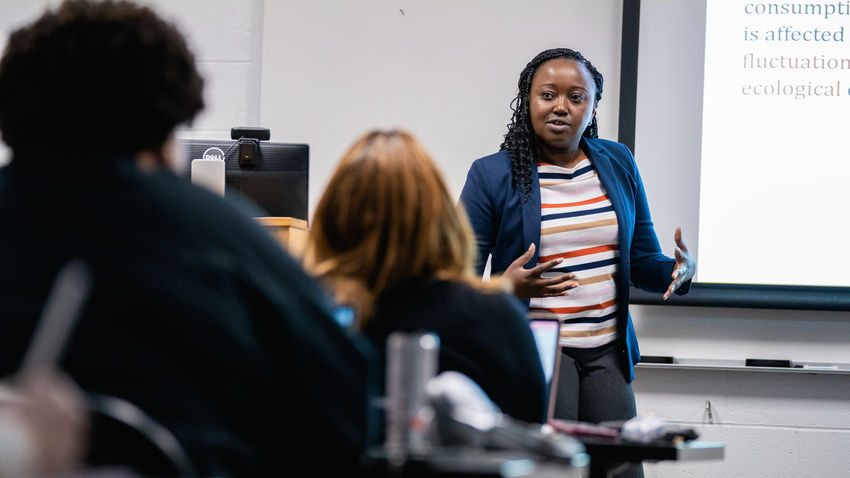
Only a very small portion of Lucy Wachira’s kinesiology class on nutrition trends is about alternative proteins. But the subject of edible insects as a valuable food source, and a delicacy in some communities, perks up the undergrad students one afternoon in her “African Perspectives on Physical Activity, Nutrition and Health” class, especially when she shows them a photo from an African food market of trays filled with pre-cooked edible insects for sale.
Some students ask for more details. Some squirm a little. “Let me move on from this picture, because I still want you to come back to class next week,” she jokes.
Most of the afternoon’s class focuses on dietary habits across selected communities in Sub-Saharan Africa and, more broadly, the need to understand the cultural, geographical, economic and other factors that influence what people eat.
“I’m sure you have good information about what’s healthy and what’s not healthy,” she tells the class, but that information is just the starting point to designing an effective health intervention. "As people in public health, we need to make sure that as we go out to different communities with our health messages, we are aware of and respect the reasons why people make the choices they make.”
“It's all about gaining appropriate cultural competencies,” Wachira explains after the class. "Trying to understand why people do what they do, before you tell them what to do.”
When Wachira arrived at Temple last fall, it was her first time setting foot in the United States. At Kenyatta University in Nairobi, Kenya, she is a tenured professor in the Department of Physical Education, Exercise and Sports Science. “We have more than 70,000 students. Our classes are huge. I'm having a good time teaching a class of 25 students here, as compared to 100,” she says.
In Kenya, her teaching and research explore physical activity and pediatric obesity. She is a champion of physical activity promotion in Sub-Saharan Africa through the African Physical Activity Network (AFPAN) and represented the continent in the development of the global recommendations, "International School-Related Sedentary Behavior Recommendations for Children and Youth."
At Temple, she is a Fulbright Visiting Scholar-In-Residence, a program aimed at helping U.S. colleges boost internationalization on their campuses. In the fall, Wachira taught two anatomy and physiology lab classes at the College of Public Health while sharing her global experience with community and university groups and working to design the African Perspectives course as an elective for this spring semester.
“It's a very interesting course, to a point that we couldn't even get a main textbook that describes the content,” Wachira says. “It has to be a little bit from here and there.”
“We try to offer a couple of unique elective courses each semester, and this one was a no-brainer,” says Mark Stoutenberg, chair of the Department of Kinesiology, who himself was a Fulbright specialist in South Africa.
The African Perspectives course provides an overview of physical activity, nutrition and health across Africa, covering historical, geographical and other factors. Part of Wachira’s aim is to shatter misconceptions people may have about the diverse continent. “What they know is what the media portrays,” she says. "Even I cannot teach about all the 54 countries, or the cultural diversity in one single country."
This afternoon, Wachira discusses the dual health challenge of undernutrition and obesity in some parts of Africa. She talks about the importance of understanding cultural influences, effects of urbanization, food sources, choices, availability, affordability and traditions in various settings. She shows photos of popular foods in selected regions—fish, grains, leafy greens and fufu, a starchy dumpling made from cassava—and discusses how these reflect local food environments.
She asks students to talk about the food choices they make for themselves and consider what has influenced them, like convenience, cost, advertising, or social factors. Then she asks how students might approach communities to start a program or spread health messages on healthy eating habits. The best answers revolve around first trying to understand local traditions, food environments, economics and social structures.
“We’ll talk about a program, but the current norm tends to rely on downloading an app or following an online program. How can we design and execute a successful program in a rural area that has limited internet connection?” Wachira asks. “We were looking at an example of the refugee camps—how do we come up with a physical activity program in a place that has limited space and no permanent structures? So, this is all to help Temple students visualize different scenarios to be able to diversify the application of their knowledge.” That’s an approach that will work not only in Africa, but wherever students may travel and find job opportunities.
After the class, students noted that, while other parts of their studies have taught them the textbook science and nuts-and-bolts of their disciplines, this course has enabled them to see those things in a new cultural context.
“For people like us whose future careers are in promoting physical activity and wellness, it’s interesting to see how we would apply skills that we’ve learned in the classroom,” Andy Pielli, a junior studying kinesiology, says.
“It makes us think outside the box, which I think will really help us in the future,” says Emma Singley, a sophomore exercise and sports science student.
Wachira also gives the students a useful tip for visiting homes in many African cultures: it’s always wise to acknowledge the head of the household and politely accept food people offered when you visit their homes—even if it might be something you never considered eating before.
“It’s important to stay open minded,” says Chris Luff, a senior majoring in exercise and sports science, after the class. "It’s important to have empathy with people from other places who have different experiences from yourself.”
